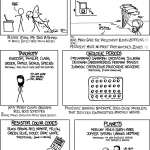Articles in the ‘Intermediate’ category Page 42
-
Benchmarking progress in Chinese to stay motivated
When we set out to learn Chinese, everything we learn is new and we can feel that we improve for each day that goes by, for each time we are exposed to the language. We know this because, in relative terms, we’re learning so much. As we progress, this feeling weakens. In this article, I discuss benchmarking and how it can help us stay motivated.
Read → -
Learning Chinese the holistic way: Integrating knowledge
Holistic learning is about integrating what you learn into a web of things you already know and thus making it much easier to learn and remember. This is in contrast with traditional education methods which often emphasise isolated facts and don’t make proper use of what learners already know.
Read → -
Achieving the impossible by being inspired
Teaching and inspiring are two closely related things. If you can see all superiors as sources of inspiration and knowledge, you will advance faster than if you view them as rivals or opponents. Similarly, realise that you have your own strong sides that inspire other people. Don’t hesitate to teach others if they want to be taught. Inspiration is cyclic in its nature and should flow freely in all directions.
Read → -
Don’t be a tourist if you want to learn Chinese language and culture
A tourist is someone who, when going abroad, takes a small piece of his country with him and stays therein. Learning Chinese as a tourist is very hard and quite inefficient. Being a tourist is not about the stated purpose of your stay, it’s about your attitude, which is why there are people who have lived in China for ages without actually learning Chinese. Stop being a tourist, step outside your comfort zone and learn Chinese!
Read → -
How to find more time to practise Chinese listening
Listening is probably the most important skill when learning Chinese, and the more you practise, the better. In order to listen as much as you should, you need to stop thinking about listening as a study activity and start thinking about it as a part of life!
Read → -
Growing up in Chinese as a foreign adult
Learning Chinese is in many ways like becoming a child again. That has it’s advantages, but it can also be incredibly frustrating at times. As usual, being aware of the problem is the first step towards solving it. Unfortunately, the only way to handle this particular problem is to adopt a healthy attitude towards it.
Read → -
Using memory aids and mnemonics to make Chinese easier
Remember almost anything is a skill that can be learnt. In fact, some of the methods I talk about in this article have been known for thousands of years. Most mnemonic methods use the power of association to enable us to remember things. In this article, I discuss how we can use this to help us learn Chinese much more efficiently than if we rely on conventional methods.
Read → -
Chinese vocabulary in your pocket
Having vocabulary with you so that you can study anywhere isn’t merely a handy trick, it’s essential. You don’t want to waste high quality time at home in front of your computer doing something you might as well do in the super market queue or while waiting for the bus. Study the right things at the right time!
Read → -
Improve your conversations by listening to the listener
Listening to a dialogue, have you ever tried listening to the person who isn’t speaking? Try listening to the listener, it will teach you many small words and sounds that help you communicate.
Read → -
Dealing with tricky vocabulary: Killing leeches
Leeches are words or characters that you keep forgetting and therefore consume much more time than other words or characters. Rather than trying to hammer these words into your brain, a specific strategy is needed to kill the leeches. This article deals with just that, how to handle difficult vocabulary you keep on forgetting.
Read →








